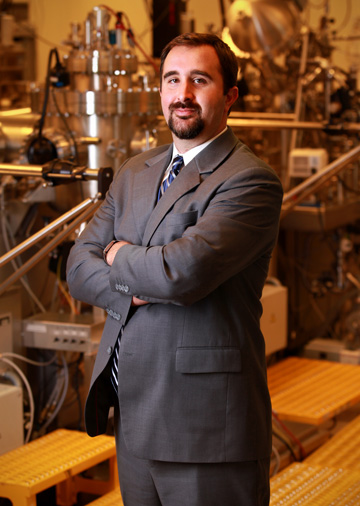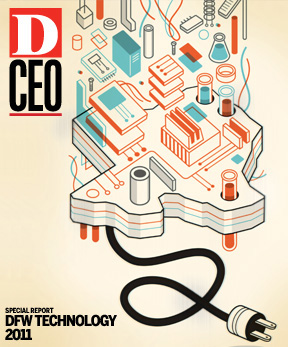In his minor league baseball career with the Arizona Diamondbacks farm system, Will Rosellini was all about the home runs. This time he’s hitting them with his company, MicroTransponder—and he’s doing it with the help of a business incubator.
While completing a master’s degree at the University of Texas at Dallas—he has an impressive six masters degrees in all—Rosellini became interested in research by neuroscience professor Dr. Larry Cauller. He began working with the Institute for Innovation & Entrepreneurship’s Venture Development Program at UTD to create a device to treat chronic pain. Other applications for the device he came up with now include tinnitus, anxiety, and post-stroke motor rehabilitation.
MicroTransponder has raised more than $18 million and will be six years old before its first product hits the market in 2012, pending FDA approval. Rosellini says access to UT Dallas advisers, researchers, and laboratory space has helped keep his costs low and enabled the company to continue searching for other neurological uses for its device.
“One of the reasons we’ve been so successful at raising money is how lean we’re running the company in terms of infrastructure and overhead,” he says. “We could survive on angel funding and grants to prove our feasibility studies, and UT Dallas is a big part of that infrastructure.”
The company, which has 12 full-time employees and more than 40 contractors, has attracted more than $5 million in research grants for ongoing study at UT Dallas labs.
The four-year-old virtual incubator at UT Dallas is one of at least eight across North Texas that are helping startups and budding high-tech entrepreneurs develop their business plans into viable operations. In most cases, all the startup needs is a laptop, cell phone, and a decent business plan to get going.
Nationally there are about 1,100 business incubators. Most offer office space for nominal fees, business service referrals for accountants, lawyers, mentors and consultants, and access to equipment and labs that most startups could never afford. They sometimes take a small equity stake in return, depending on if they’re publicly or privately run. When the companies are ready, incubators use their street credibility to introduce them to angels and venture capitalists.
From September 2009 to September 2010, the UT Dallas incubator, which focuses on technological inventions created within its walls, spun out five enterprises, and four the prior year. Some will make it, some won’t, and others will license their technologies to related companies, says Robert Robb, director of venture development.
“The reason we engage in this process is we want to see the technology commercialized and not sit on a shelf,” says Robb, who also is an associate vice president for tech commercialization at UT Dallas. “Because our funding comes from the state or federal government, the taxpayers have paid for it. We want to make sure those technologies get back into the hands, or at least, put into the market, for the benefit of the public that funded it.”
Motivating Factors
The National Business Incubation Association has found that business incubators reduce the risk of small business failures. Eighty-seven percent of companies that have graduated from NBIA incubators are still in business.
The interest in local incubators is on the rise as layoffs motivate more people to start their own business. The role of incubators also has changed in the past several years because early-stage funding is harder for startups to capture. Incubators help companies stretch the dollars between the seed/friends and family stage and angel investor funding.
That gap is wider now, says Larry Calton, founder and executive director of the not-for-profit North Texas Enterprise Center, which was launched in 2003.
“The venture capitalists have moved upstream a bit and are taking less risk and not putting up as much money,” Calton says. “We’re trying to do our part to fill part of that gap, and help them stay alive long enough so they matter to the angel community.”
Frisco-based NTEC, which specializes in medical technology and clean technology, takes a hands-on approach by adding a staff adviser to the company’s senior management team and giving the team access to seasoned professionals. Ideal companies are “game-changers” or those that can make a significant economic and medical contribution to society. The hope is that NTEC companies will hit $50 million within five years of developing a marketable product.
EmFinders, a tech company that sells a watch-like device equipped with cellular technology to identify a wandering person’s whereabouts, is one of NTEC’s success stories. Formed by telecom veterans Jim Nalley and Chris Buehler in 2007, the company launched its first product in late 2009 after TruePosition Inc., a subsidiary of Liberty Media Corp., assumed a controlling interest.
EmFinders is based at NTEC’s facility, which has enough room to house 80 offices, 30 cubicles and about 30 laboratory spaces, all for a monthly rate. In the second quarter of 2011, the incubator will convert 6,500 square feet to accommodate light medical assembly work. It plans to add a 4,500-square-foot conference center in the third quarter.
“When you come here you get to rub elbows with others who are suffering similar challenges or who may have solved the problem your company is facing,” Calton says. “We try to make it fun here and create an opportunity for people to cross-pollinate.”
Community Assets
One of the newest incubators on the scene is the Pipeline at BioCenter at UT Southwestern Medical Center. Pipeline opened its doors in April 2010, and was preparing to sign its first company in early November. The incubator is housed within BioCenter, a 15.5-acre commercial complex that opened in April 2010.
John Elwood, acting director, says he’s been speaking to a number of companies outside of Texas that are derailed by high costs in their own states and are attracted to the different types of potential capital here, such as the Texas Emerging Technology Fund. Many of those could be future Pipeline clients.
“Pipeline benefits the university and the region and gives a local outlet for the technology that has been going to the West and East coasts,” Elwood says. “A lot of licensing that occurs [here] goes to companies that are not located here. There’s always been a big need for biomedical infrastructure that is amenable to startup companies here in North Texas.”
The incubator has room for four offices and eight cubes, and offers lab and conference room space for a fee. Maybe even more important, incubator companies have access to renowned UT Southwestern scientists and clinicians, who can serve on advisory boards and as collaborators, and assist with sponsored research agreements.
TECH Fort Worth is one of the oldest incubators in North Texas. The nonprofit, which was formed 12 years ago, doesn’t take equity in its technology-based companies. Its focus is on job and wealth creation for the community.
One of the incubator’s greatest success stories to date is via entrepreneur Fred Kimble, a former Lockheed Martin and Siemens executive. He approached TECH Fort Worth in 2006 for help establishing MobiMed Technologies, a telemedicine company. During the past four years, Kimble has started a number of companies; combined, they now employ nearly 200. Some are service-oriented and others are more technology-based, and all fall under the umbrella of his holding company, Altofaro LLC, says Darlene M. Ryan, executive director at TECH Fort Worth.
The group offers both incubation and acceleration programs. Incubated companies aren’t housed onsite, but receive help with their business model and other services. There are 16 acceleration clients who can choose onsite space—and demand remains high, Ryan says.
“Most of our clients tend to be people who have come out of careers in big companies, but are starting a first company of their own,” she says. “As more people have left big companies, we get more interest in doing this. It’s very exciting and rewarding to see all of the new things being created, whether it’s medical devices or energy technology or pharmaceuticals, and to have a part in that.”
Preparing for Takeoff
Here’s a look at eight tech incubators that are helping DFW entrepreneurs take flight.
1. Center for Innovation at UT Arlington
Top Executive: Sergio Bento, director
Year Founded: 2001
Specialty: Technology
Success Story: Imagecom Inc.
Web: www.thecenterforinnovation.org
2. Institute for Innovation & Entrepreneurship ’s Venture Development Program (UT Dallas)
Top Executive: Robert Robb, director of venture development
Year Founded: 2007
Specialty: Technology commercialization with UTD affiliation
Success Story: MicroTransponder Inc.
Web: http://innovation.utdallas.edu
3. NTEC Inc., Frisco
Top Executive: Larry Calton, executive director and founder
Year Founded: 2003
Specialty: Medical technology
Success Story: EmFinders
Web: www.ntec-inc.org
4. Pipeline at BioCenter at UT Southwestern Medical Center
Top Executive: John Elwood, acting director
Year Founded: 2010
Specialty: Biomedical
Success Story: n/a (just signed first client)
Web: www.pipelineatbiocenter.com
5. STARTech Early Ventures
Top Executive: Matt Blanton, founder and managing partner
Year Founded: 1997
Specialty: Technology
Success Stories: Seven profitable exits and more than 20 sustained businesses
Web: www.startechev.com
6. TECH Fort Worth
Top Executive: Darlene M. Ryan, executive director
Year Founded: 1998
Specialty: Companies with any form of proprietary technology
Success Story: MobiMed
Technologies
Web: http://techfortworth.org
7. Tech Wildcatters
Top Executive: Gabriella Draney, managing partner
Year Founded: 2009
Specialty: Seed accelerator that focuses on B2B technology and web companies
Success Stories: Two of the five companies in its inaugural class received venture funding within three months of completion; all five are still in business.
Web: www.techwildcatters.com
8. UNT Technology Incubator
Top Executive: Harold Strong, director
Year Founded: 2010
Specialty: Technology
Success Stories: MedAutomate Diagnostic Inc. and Solar Logic
Web: http://discoverypark.unt.edu






